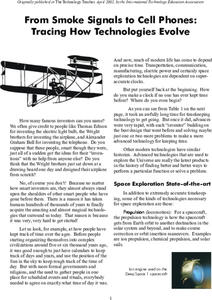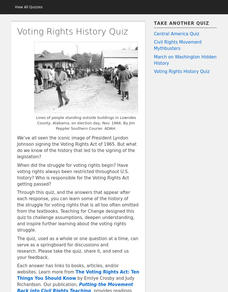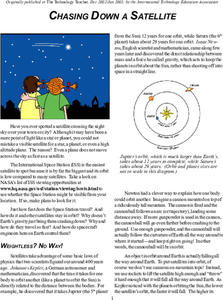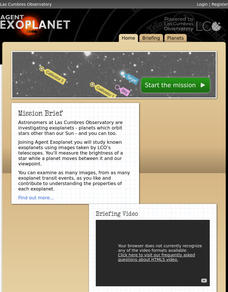Flipped Math
Calculus AB/BC - Unit 2 Review: Differentiation
Tie up everything in one differentiable bow. Pupils work through 20 problems to review the concepts from the unit. The problems range from finding the average rate of change to finding the derivatives of various functions that require...
Norton Life Lock
Digital Citizenship Jeopardy
Fake News & Clickbait, Privacy, Tech & the Internet, Cyberbullying, and Ethics & Netiquette are the categories in a Jeopardy game that tests the class's knowledge of Digital Citizenship.
Norton Life Lock
The Nine Ds of Digital Citizenship
A reference page identifies the nine Ds of digital citizenship—digital access, etiquette, commerce, responsibilities, literacy, law, communication, security, health, and wellness.
Flipped Math
Calculus AB/BC - Estimating Limit Values from Tables
There's value in using a video to analyze a table of values. Pupils learn how to find the limit of a function from a table of values in the fourth of 18 lessons in Unit 1 - Limits and Continuity. An engaging video gives a tutorial on how...
Flipped Math
Calculus AB/BC - Can Change Occur at an Instant?
Be instantly transfixed by the idea of instantaneous rates of change. Scholars watch an informative video that introduces the fathers of calculus, Newton and Leibniz. They then learn about instantaneous rates of change by first...
NASA
From Smoke Signals to Cell Phones: Tracing How Technologies Evolve
Explore the science of space exploration. Pupils consider technological advances in propulsion, communication, power, navigation, and imaging. They select one of these areas and create a timeline of historical progress that contributed...
American Museum of Natural History
Gusty: The Gut Microbiome Card Game
Build up your gut. Groups up to four play a card game to learn more about the microbiome in the gut. Learners try to build a healthy gut with their cards. The player acquiring six microbes without any pathogens wins the game.
Nemours KidsHealth
Conflict Resolution: Grades 9-12
Conflicts happen. Learning to deal with them positively, manage anger, and communicate feelings is the focus of a lesson that gives high schoolers the tools they need for conflict resolution. After reading a series of related articles,...
Teaching for Change
Voting Rights History Quiz
An 11-question online quiz permits young historians to check their knowledge of the history of voting rights in the United States. After reading a short introduction, individuals click through the questions that test their knowledge of...
PBS
PBS Electoral Decoder
Imagine being able to explore all the presidential elections from 1789-2016! Being able to examine the key events, how the states voted, and the importance of the Electoral College in each of the elections! A PBS cartogram makes all this...
NASA
Mapping the Watery Hills and Dales
How does GPS know where everything is located? Pupils read about satellites that are mapping the ocean and the question on how satellites know where they are. Readers discover the workings of the Global Positioning System and create...
NASA
Chasing Down a Satellite
Calculate the speed of the International Space Station. By reading the article, pupils learn about the concept of orbits. Scholars work through a formula to determine how fast the International Space Station is traveling to stay in...
Las Cumbres Observatory
Agent Exoplanet
Not everything revolves around the sun! Believe it or not, there are planets, called exoplanets, that orbit stars other than our sun. Learners use an interactive online resource to research several of these planets. They learn about the...
Las Cumbres Observatory
Down2Earth: Making Impact Craters
Is the sky falling? Learners use a simulator to modify the mass and velocity of asteroids and collect data on how they influence the diameter and depth of the impact crater. They use their results to draw conclusions and make predictions...
Las Cumbres Observatory
Star In a Box
Stars may all look the same from down here, but their surfaces tell a different story. Using an animation, learners collect data about the temperature and luminosity of stars and compare them to their mass and radius. They then answer...
American Museum of Natural History
Ask a Scientist About Our Environment
Let's ask an expert! Scientists at the American Museum of Natural History field questions about the environment in an interactive resource. Question topics range from global warming and conservation to endangered species and habitats.
American Museum of Natural History
Ask a Scientist About Dinosaurs
Who doesn't want to know more about the mysterious dinosaurs? Learners read about dinosaurs and the process scientists use to continue learning more about the animals in an interview-type format. A paleontologist responds to submitted...
American Museum of Natural History
Theodore Roosevelt's Outdoor Adventures
Time for a virtual sightseeing trip. Pupils explore the Grand Canyon, Devil's Tower, and Yosemite Valley in an interactive online experience. They answer questions about the organisms in each location and draw conclusions based on their...
American Museum of Natural History
Bird Watching with Theodore Roosevelt
If you can't go to the birds, bring the birds to you! An interactive lesson helps learners identify different bird types by sight and sound. Pop-ups provide information about the different birds and audio plays the sound each bird makes.
American Museum of Natural History
All About Horses
Horses come in all shapes and sizes, but all belong to the same species. Young scholars explore the different traits and connect the information to genetic modification. The interactive gives them the option to read about 18 different...
American Museum of Natural History
What's This? Reproduction
Attracting the right mate is as important for humans as any other species. An interesting lesson teaches individuals about several strategies that animals and plants have adapted to attract their mates. From colorful nests to powerful...
NASA
Blinded by the Light!
Pupils learn of multiple ways astronomers look for planets outside of the solar system. By completing a hands-on activity, scholars discover that trying to see the planets directly because of the glare from the nearby star is nearly...
NASA
Speaking in Phases
Hear from deep space. Pupils learn how satellites transfer information back to Earth. They learn about three different ways to modulate radio waves and how a satellite sends information with only 0s and 1s. Using sound, class members...
NASA
Water Works on a Blue Planet
Keep within a water budget. Learners find out that less than 2.5% of Earth's water is available to drink—and that there is a fixed amount of water. Scholars read an interesting article comparing the available water to a game of Monopoly...

























